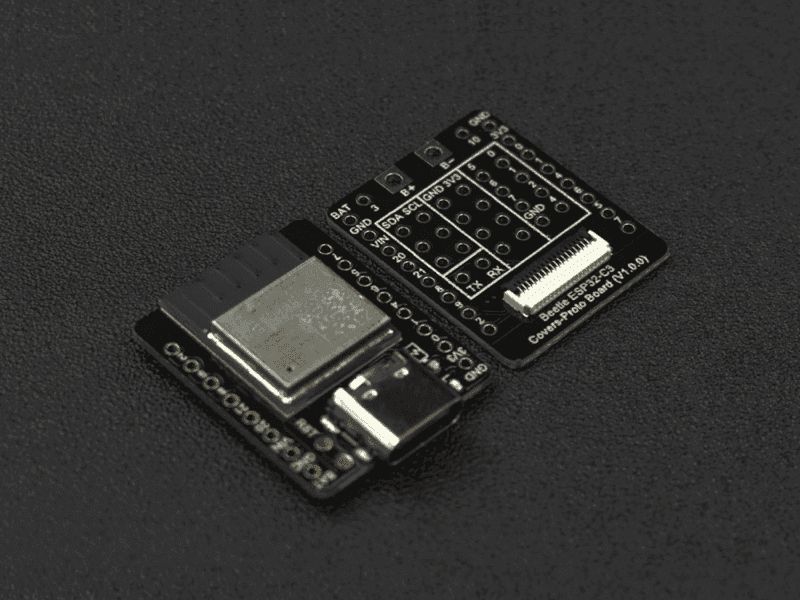
DFRobot Beetle ESP32-C3 by DFRobot
Beetle ESP32-C3, mainly intended for IoT applications, is a controller based on ESP32-C3 RISC-V 32bit single-core processor.
On a coin-size board of 25*20.5 mm, there are up to 13 IO ports broken out, so you don’t have to worry about running out of IO ports when making projects. Meanwhile, li-ion battery charging management function is integrated on the board which allows to directly connect li-ion battery without extra modules, while ensuring the application size and safety.
The equipped expansion board for Beetle ESP32-C3 brings out more power sources without increasing product volume, more convenient to solder. Besides, the onboard easy-to-connect GDI saves the trouble of wiring when using a screen.
Interface pins
- Digital I/O x13
- LED PWM controller with 6 channels
- SPI x1
- UART x2
- I2C x1
- I2S x1
- Infrared receiver and transmitter: transmit channel x2, receive channel x2, (any pin)
- 2 × 12-bit SAR A/D converters, 6 channels
- DMA controller, 3 receive channels and 3 transmit channels
- USB Type-C: 5V
- PIN10/LED: Onboard LED pin
- ESP32-C3 module: the latest ESP32-C3 module launched by Espressif
- RST: reset pin, short contact point trigger reset
- TP4057: TP4057 lithium battery charge management chip
- Charge: charging indicator
- Off: not plugged in power supply or fully charged
- On: charging
- Blinking: battery not connected
- 18Pin-FPC:GDI display interface
To Boot into Firmware Download Mode

- Pull PIN 9 Down
- Place a jumper across RST and hold for 3 seconds
- Release RST and PIN 9
- Flash as normal per Espressif port instructions
Purchase
Add any links to purchase the board
Contribute
Have some info to add for this board? Edit the source for this page here.
CircuitPython 9.2.8
This is the latest stable release of CircuitPython that will work with the DFRobot Beetle ESP32-C3. Use this release if you are new to CircuitPython.
Modules included in this download
_asyncio _pixelmap adafruit_bus_device adafruit_pixelbuf analogbufio analogio array atexit audiobusio audiocore audiomixer audiomp3 binascii bitbangio bitmaptools board builtins builtins.pow3 busdisplay busio busio.SPI busio.UART canio codeop collections digitalio displayio dualbank epaperdisplay errno espidf espnow fontio fourwire framebufferio getpass gifio hashlib i2cdisplaybus io ipaddress jpegio json keypad keypad.KeyMatrix keypad.Keys keypad.ShiftRegisterKeys locale math max3421e mdns microcontroller msgpack neopixel_write nvm onewireio os os.getenv ps2io pulseio pwmio rainbowio random re rgbmatrix rtc sdcardio select sharpdisplay socketpool socketpool.socketpool.AF_INET6 ssl storage struct supervisor synthio sys terminalio tilepalettemapper time touchio traceback ulab usb vectorio warnings watchdog wifi zlibFeatures: Battery Charging, Bluetooth/BTLE, Breadboard-Friendly, External Display, USB-C, Wi-Fi
CircuitPython 10.0.0-beta.0
This is the latest development release of CircuitPython that will work with the DFRobot Beetle ESP32-C3.
Alpha development releases are early releases. They are unfinished, are likely to have bugs, and the features they provide may change. Beta releases may have some bugs and unfinished features, but should be suitable for many uses. A Release Candidate (rc) release is considered done and will become the next stable release, assuming no further issues are found.
Please try alpha, beta, and rc releases if you are able. Your testing is invaluable: it helps us uncover and find issues quickly.
Release Notes for 10.0.0-beta.0
Modules included in this download
_asyncio _bleio _bleio (native) _eve _pixelmap adafruit_bus_device adafruit_pixelbuf aesio alarm analogbufio analogio array atexit audiobusio audiocore audiomixer audiomp3 binascii bitbangio bitmapfilter bitmaptools board builtins builtins.pow3 busdisplay busio busio.SPI busio.UART canio codeop collections digitalio displayio epaperdisplay errno espidf espnow fontio fourwire framebufferio getpass gifio hashlib i2cdisplaybus io ipaddress jpegio json keypad keypad.KeyMatrix keypad.Keys keypad.ShiftRegisterKeys keypad_demux keypad_demux.DemuxKeyMatrix locale lvfontio math max3421e mdns microcontroller msgpack neopixel_write nvm onewireio os os.getenv ps2io pulseio pwmio rainbowio random re rgbmatrix rtc sdcardio select sharpdisplay socketpool socketpool.socketpool.AF_INET6 ssl storage struct supervisor synthio sys terminalio tilepalettemapper time touchio traceback ulab usb vectorio warnings watchdog wifi zlibFeatures: Battery Charging, Bluetooth/BTLE, Breadboard-Friendly, External Display, USB-C, Wi-Fi
Absolute Newest
Every time we commit new code to CircuitPython we automatically build binaries for each board and language. The binaries are stored on Amazon S3, organized by board, and then by language. These releases are even newer than the development release listed above. Try them if you want the absolute latest and are feeling daring or want to see if a problem has been fixed.
Previous Versions of CircuitPython
All previous releases of CircuitPython are available for download from Amazon S3 through the button below. For very old releases, look in the OLD/ folder for each board. Release notes for each release are available at GitHub button below.
Older releases are useful for testing if you something appears to be broken in a newer release but used to work, or if you have older code that depends on features only available in an older release. Otherwise we recommend using the latest stable release.
